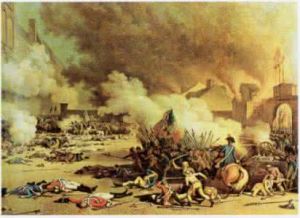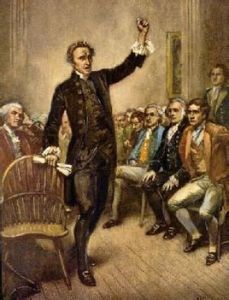示例
哥哥豈不聞歐美人嘴唇皮掛著的話說道:“~”,……(清·梁啓超《新中國未來記》第三回) 不自由,毋寧死
原文
在維吉尼亞州議會上的演講
(美國)亨利1775年3月23日
議長先生:
沒有誰比我更加敬佩這些在議會上發言的先生們的愛國熱情和才幹了。但是,對待一個問題每個人都會有不同的看法。因此,假如我持有觀點與他們恰恰相反,並且無所顧忌毫不保留地表達出來,希望不會被認為對他們有何不敬之意。現在已經沒有時間讓我們講客套了。議會所面臨的問題是我們的國家正處於危難之際。我個人認為,最嚴重的一點就是關係到我們是獨立自主還是被奴役的大問題。事關重大,應該準許人們暢所欲言。如此,我們才有望闡明事實,完成上帝和國家託付的重任。此時此刻,如果因為害怕冒犯他人而保持緘默,我會認為自己是在叛國,是對比世上所有君王更令人敬畏的天主的不忠。
議長先生,人類天生就容易沉迷於希望的幻想之中。痛苦的現實來臨時,我們往往會緊閉雙眼不敢面對;寧可傾聽海妖的歌聲,直到我們被變成野獸為止。這是聰明人在追求自由的艱苦卓絕的奮鬥中所應該做的嗎?我們難道願意做那些對關係著能否獲得拯救這樣重大的事情視而不見,聽而不聞的人嗎?就我而言,不管這會帶給我多大的精神折磨,我都願意了解全部的事實和最糟糕的結果,並為此作好準備。
經驗是指導我前進的惟一明燈;過去是判斷未來的惟一依據。因此,我想知道英國政府在過去十年中有何作為,使得各位有理由信心十足心甘情願地來安慰自己也安慰議會?是因為他們最近接受我們的請願時所露出的狡詐的笑容嗎?先生們,別相信這些笑容,事實會證明這只是一個圈套。別被人家的一個吻給出賣了!大家想想:他們如此仁慈地接受我們的請願,而同時又在我們的水域、我們的土地上大規模地備戰,這是多么不協調呀!難道愛護與和解用得著出動他們的戰艦和軍隊嗎?難道我們的愛需要用武力才能挽回嗎?先生們,別再自欺欺人了!這些只是戰爭和征服的手段,是國王最後的託詞。請問各位,如果這些軍事裝備不是用來迫使我們歸順的,那它們是用來乾什麼的呢?哪位先生能告訴我,這還有什麼別的意圖嗎?難道在這個地方,大不列顛王國還有其他敵人需要用這些龐大的海陸軍隊來對付嗎?不,先生們,沒有其他敵人了!這些就是用來對付我們的!它們是英國政府早就造好,用來囚禁我們的鎖鏈。我們能用什麼來反抗呢?爭辯嗎?先生們,我們已經和他們爭辯10年了!再還有什麼話可說嗎?我們所能做的都做過了,然而一切都只是徒勞;難道我們還要卑躬屈膝,搖尾乞憐嗎?我們已經用盡了一切辦法。所以,先生們,我懇請你們別再自欺欺人了!為了避免這一場即將來臨的風暴,我們已經盡力而為了。我們請願過,我們抗議過,我們也乞求過;我們曾跪倒在國王的御座前,哀求他制止政府和國會的專制暴行。我們的請願遭到蔑視,我們的抗議帶來的是變本加厲的暴力和侮辱,我們的乞求換來的是不屑一顧;我們在天子腳下被輕蔑地一腳踢開!事已至此,我們還能沉迷於和平友好的美好幻想之中嗎?已經不再有任何希望了!假如我們渴望自由——假如我們真要維護為之奮鬥已久的神聖權利不受侵犯——假如我們不至於卑鄙到想放棄我們抗爭已久,發誓不達目的決不罷休的偉大角逐,那么,我們必須戰鬥!我再重複一遍,先生們,我們必須戰鬥!除了訴諸武力,求助於戰神,我們別無選擇!
先生們,他們說我們勢單力薄,無力抵抗如此強勁的對手。但是,我們什麼時候能變得更加強大呢?下周?還是明年?難道非要等到我們被徹底解除武裝,家家戶戶都被英軍占領的時候嗎?難道優柔寡斷,毫無作為能為我們積聚力量嗎?難道我們能高枕而臥,要等到束手就擒之時,才能找到退敵的良策嗎?先生們,只要我們懂得如何利用造物主賜予我們的力量,我們就絕不弱小。我們擁有三百萬為神聖的自由而武裝起來的人民,我們擁有這樣一方國土,這就是敵人任何武力都不可戰勝的力量!況且,先生們,我們並非孤軍作戰。公正之神與我們同在,並主宰著一切國家的命運,並會喚起朋友們為我們進行戰鬥。先生們,戰鬥需要的不只是強大的力量,還需要機警,積極和勇敢;何況我們已經別無選擇了。即使我們卑怯懦弱,想抽身而出,也已經太晚了。我們無路可退,回首隻是屈從和被奴役!囚禁我們的枷鎖早已鑄成,鐐銬的?啷聲迴蕩在波士頓平原的上空!戰爭已經在所難免——那就讓它來吧!先生們,我再說一遍,讓它來吧!
先生們,不用再徒勞地試圖緩和事態。各位可以高喊和平——但和平並不存在。事實上戰爭已經打響!很快,從北方席捲而來的風暴就將帶來隆隆的炮聲!我們的弟兄們已經奔赴戰場!為何我們還在此袖手旁觀?各位先生究竟想要什麼?又能得到什麼?莫非生命如此珍貴,和平如此美好,竟值得我們以鐐銬和奴役為代價來獲得?全能的主啊,快阻止他們吧!我不知道別人將選擇怎樣的道路,但對我來說,不自由,毋寧死!
亨利演講辭的英文版
Give Me Liberty Or Give Me Death
Patrick Henry, March 23, 1775.
Mr. President: No man thinks more highly than I do of the patriotism, as well as abilities, of the very worthy gentlemen who have just addressed the House. But different men often see the same subject in different lights; and, therefore, I hope it will not be thought disrespectful to those gentlemen if, entertaining as I do opinions of a character very opposite to theirs, I shall speak forth my sentiments freely and without reserve. This is no time for ceremony. The questing before the House is one of awful moment to this country. For my own part, I consider it as nothing less than a question of freedom or slavery; and in proportion to the magnitude of the subject ought to be the freedom of the debate. It is only in this way that we can hope to arrive at truth, and fulfill the great responsibility which we hold to God and our country. Should I keep back my opinions at such a time, through fear of giving offense, I should consider myself as guilty of treason towards my country, and of an act of disloyalty toward the Majesty of Heaven, which I revere above all earthly kings.
Mr. President, it is natural to man to indulge in the illusions of hope. We are apt to shut our eyes against a painful truth, and listen to the song of that siren till she transforms us into beasts. Is this the part of wise men, engaged in a great and arduous struggle for liberty? Are we disposed to be of the number of those who, having eyes, see not, and, having ears, hear not, the things which so nearly concern their temporal salvation? For my part, whatever anguish of spirit it may cost, I am willing to know the whole truth; to know the worst, and to provide for it.
I have but one lamp by which my feet are guided, and that is the lamp of experience. I know of no way of judging of the future but by the past. And judging by the past, I wish to know what there has been in the conduct of the British ministry for the last ten years to justify those hopes with which gentlemen have been pleased to solace themselves and the House. Is it that insidious smile with which our petition has been lately received? Trust it not, sir; it will prove a snare to your feet. Suffer not yourselves to be betrayed with a kiss. Ask yourselves how this gracious reception of our petition comports with those warlike preparations which cover our waters and darken our land. Are fleets and armies necessary to a work of love and reconciliation? Have we shown ourselves so unwilling to be reconciled that force must be called in to win back our love? Let us not deceive ourselves, sir. These are the implements of war and subjugation; the last arguments to which kings resort. I ask gentlemen, sir, what means this martial array, if its purpose be not to force us to submission? Can gentlemen assign any other possible motive for it? Has Great Britain any enemy, in this quarter of the world, to call for all this accumulation of navies and armies? No, sir, she has none. They are meant for us: they can be meant for no other. They are sent over to bind and rivet upon us those chains which the British ministry have been so long forging. And what have we to oppose to them? Shall we try argument? Sir, we have been trying that for the last ten years. Have we anything new to offer upon the subject? Nothing. We have held the subject up in every light of which it is capable; but it has been all in vain. Shall we resort to entreaty and humble supplication? What terms shall we find which have not been already exhausted? Let us not, I beseech you, sir, deceive ourselves. Sir, we have done everything that could be done to avert the storm which is now coming on. We have petitioned; we have remonstrated; we have supplicated; we have prostrated ourselves before the throne, and have implored its interposition to arrest the tyrannical hands of the ministry and Parliament. Our petitions have been slighted; our remonstrances have produced additional violence and insult; our supplications have been disregarded; and we have been spurned, with contempt, from the foot of the throne! In vain, after these things, may we indulge the fond hope of peace and reconciliation. There is no longer any room for hope. If we wish to be free-- if we mean to preserve inviolate those inestimable privileges for which we have been so long contending--if we mean not basely to abandon the noble struggle in which we have been so long engaged, and which we have pledged ourselves never to abandon until the glorious object of our contest shall be obtained--we must fight! I repeat it, sir, we must fight! An appeal to arms and to the God of hosts is all that is left us!
They tell us, sir, that we are weak; unable to cope with so formidable an adversary. But when shall we be stronger? Will it be the next week, or the next year? Will it be when we are totally disarmed, and when a British guard shall be stationed in every house? Shall we gather strength by irresolution and inaction? Shall we acquire the means of effectual resistance by lying supinely on our backs and hugging the delusive phantom of hope, until our enemies shall have bound us hand and foot? Sir, we are not weak if we make a proper use of those means which the God of nature hath placed in our power. The millions of people, armed in the holy cause of liberty, and in such a country as that which we possess, are invincible by any force which our enemy can send against us. Besides, sir, we shall not fight our battles alone. There is a just God who presides over the destinies of nations, and who will raise up friends to fight our battles for us. The battle, sir, is not to the strong alone; it is to the vigilant, the active, the brave. Besides, sir, we have no election. If we were base enough to desire it, it is now too late to retire from the contest. There is no retreat but in submission and slavery! Our chains are forged! Their clanking may be heard on the plains of Boston! The war is inevitable--and let it come! I repeat it, sir, let it come.
It is in vain, sir, to extenuate the matter. Gentlemen may cry, Peace, Peace-- but there is no peace. The war is actually begun! The next gale that sweeps from the north will bring to our ears the clash of resounding arms! Our brethren are already in the field! Why stand we here idle? What is it that gentlemen wish? What would they have? Is life so dear, or peace so sweet, as to be purchased at the price of chains and slavery? Forbid it, Almighty God! I know not what course others may take; but as for me, give me liberty or give me death!
相關資料
人物
派屈克·亨利(Patrick Henry,1736~1799),蘇格蘭裔美國人。他生於維吉尼亞,是維吉尼亞殖民地最成功的律師之一,以機敏和演說技巧而著稱。他是獨立戰爭時期的自由主義者,美國革命時期傑出的政治家、演說家,被稱為“美國革命之舌”。他是著名的《獨立宣言》的主要執筆者之一,曾任維吉尼亞州州長,深受愛戴,被譽為“維吉尼亞之父”。在反英鬥爭中發表過許多著名演說。被普遍傳誦的警句“不自由,毋寧死”就出自他的演說。
歷史背景
18世紀中葉,北美要求獨立的呼聲越來越高,面對這種情況,英國政府軟硬兼施,採用各種手段,力圖維持它與北美殖民地的宗主國關係。殖民地某些人由於在利益上與英國有聯繫,主張效忠英國;有些人對未來誰來統治他們漠不關心,他們願意向任何一方出售商品,誰給的價錢高就賣給誰。還有些人對於反抗英國感到悲觀,極力主張和解。在種種壓力下,北美殖民地獨立的步伐始終是"慢慢吞吞、勉勉強強"的。第一屆大陸會議隻字未提獨立問題,進入70年代,萊剋星敦已經打響了獨立的第一槍,獨立已擺到了議事日程上,成為人們談論的熱點問題,然而各種意見仍然爭執不休,不能統一。
60年代,亨利就在維吉尼亞州議會上提出了一系列決議,堅決反對英國向殖民地人民徵收印花稅。在獨立問題上,亨利更是個激進派。他主張北美殖民地不惜以自己的生命和鮮血來換取獨立,擺脫對英國的依附關係。1775年3月23日,他在維吉尼亞州議會上發表了這篇演講。
亨利的主張明確,態度堅決,立場十分鮮明,這已為社會所知。然而這篇演講是在議會上發表的,議會是宣傳自己主張的講壇,也是政治鬥爭的場所。要使自己的主張能為眾人接受,爭取各方面的理解和支持,就要講究策略。所以演講一開始,亨利並未用激烈的語調,義正辭嚴的態度,令其演講的內容充滿劍拔弩張的火藥味。而是採用委婉的態度,舒緩的語調,首先肯定了在他之前發言的幾位議員的良善用心。然後婉轉地道出自己的主張與上面幾位議員有所不同,避免驚人之舉。演說開始這種求同存異的做法,表現了亨利的政治智慧,也為下面的發言爭取眾多的擁護者打下了基礎。
在議員中,主張效忠英國的人雖有,但只是少數。對這極少數人,要靠言詞來打動他們,使他們轉變立場,幾乎是不可能的。相比之下,主張與英國妥協、避免武力中突的議員較多,這部分議員是爭取的對象。他們主張和解,反對戰爭的理由主要有兩點:一是對英國抱有各種各樣的幻想;二是認為英國武力強大,自己勢單力薄,萬一戰爭爆發,後果不堪構想。對此,亨利看得很清楚,他的演講就是針對著保守派和溫和分子的,因而演說在內容上緊緊扣住上述兩點,一步步詳細闡述,一段段逐層批駁,最後歸引到結論上來:"唯一的出路只有訴諸武力,求助於戰爭之神。"演說內容的安排,體現了亨利的政治策略,也說明了一篇演說的結構,要受到演講者追求的政治目的的制約。
評論
這篇演講開始時語調舒緩,但隨著演講的進行,調子越來越堅決,言辭越來越峻急,態度越來越激烈。從修辭角度看,這與大量使用排比、反問、感嘆、長短句交錯等表達手法有密切關係,同時也與使用精練而富有鼓動性的名言警句分不開,尤其是演講的最後一句話,"不自由,毋寧死",氣勢磅礴,鏗鏘有力,把演講推向了高潮,給聽眾深刻的印象。這一警句當時不脛而走,深深鼓舞了人們為爭取獨立而進行的鬥爭,而且兩百年來家喻戶曉,一直為人們所傳頌。
 不自由,毋寧死
不自由,毋寧死
